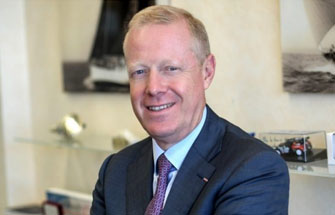Interview with Hervé Ordioni, Managing Director at Edmond de Rothschild Monaco and Chair of the Monaco Association for Financial Activities (AMAF)’s Committee on Promoting the Monegasque Financial Industry.
How does Edmond de Rothschild incorporate sustainable finance principles?
First, by drawing on the strength of a commitment which goes back a very long way, one which we have been actively demonstrating for several decades. With our tradition of philanthropy and a wealth of programmes reflecting this DNA, it was natural for us to incorporate environmental impact and sustainable development when managing listed assets for our clients.
We therefore identified everything that might make up a cohesive whole that would reflect our values, in order to create a portfolio that would have an impact on sustainability issues and to develop conviction-driven management that would be responsible and profitable.
Does this translate into specific services?
Beyond our traditional activities, we have positioned ourselves on sustainable finance, particularly in private equity, with, for example, the Edmond de Rothschild Private Equity Pearl Strategy, which is focused on European environmental infrastructure. This is about funding turnkey solutions in the fields of water cycle management, renewable energy, energy efficiency, recycling and waste recovery: Ginkgo, with 600,000 m2 of remediated land; Moringa, with 3,300 ha of sustainably managed land, 7,500 ha of rehabilitated forest and a target of 25,000 ha by 2027, 6,535 farmers supported to manage their land more sustainably and a target of 20,000 by 2027, and 5 million trees planted.
Likewise, infrastructure debt: with the Bridge fund, for example, 33% of portfolios are invested in renewable energy projects and 809 MWh of renewable energy has been generated (this figure will increase by around 700 MWh following completion of two projects currently in development).
The group also takes action itself: on sustainable agriculture and respect for the environment, for example, it encourages biodiversity internally through its bug hotels (accommodating 140,000 bees in Paris). It also acts through Edmond de Rothschild Heritage: organic waste from the Ferme des 30 Arpents is recycled, while the Four Seasons in Megève combines luxury tourism and environmental protection: it has 200 m2 of solar panels, uses 600 m2 of local wood and recycles 75% of construction waste locally.
Our socially responsible investing (SRI) mandates also reflect this determination to tackle energy efficiency and help businesses to become less reliant on fossil fuels. Our choices are always guided by a commitment to gradually decarbonise portfolios.
Is ESG integration something more recent?
In 2018, we formalised an approach for integrating ESG, and this has been gradually expanded to all relevant asset classes and all geographic areas. Initially based on an obligation of means, it now includes an obligation of ESG results. ESG integration is demanding and has a formal impact on the investment goal as well as the investment process. It allows us to categorise funds based on this approach as Article 8 funds under the Sustainable Finance Disclosure Regulation (SFDR).
While exclusions are used as a last resort, we have created an official exclusions policy for sectors that are, in our view, the least compatible with our responsible investor approach, such as controversial weapons, thermal coal and tobacco.
Over more than a decade, we have developed our own proprietary ESG analysis model: EdR BUILD (Bold, Universal, Impact, Long Term, Differentiation). This model enables the Responsible Investment team to express its non-financial convictions independently of external databases. The methodology it uses is detailed – more than 40 criteria are analysed – strikes a balance across the three pillars (E, S and G), and includes proprietary indicators. The areas assessed cover key challenges, including climate change, water, biodiversity, safety and security, human development, gender equality, business ethics and responsible governance practices.
“The Edmond de Rothschild group is keen to represent a different way of managing investments, guided by strong convictions. This goes beyond simply seeking short-term financial returns, instead giving our clients the opportunity to leave their mark on the world and give meaning to their investments.”
Ariane de Rothschild
Chair of the Board of Directors of the Edmond de Rothschild group
POSITIVE ESG SCREENING: this involves selecting companies on the basis of their good environmental, social and governance practices. The best-in-class approach favours companies that score the highest on non-financial indicators, sector by sector. The best-in-universe approach, adopted by Edmond de Rothschild Asset Management (France), involves selecting the issuers with the best ESG practices regardless of which sector they operate in. The best-effort approach aims to select issuers who have shown an improvement in their ESG practices over time.






